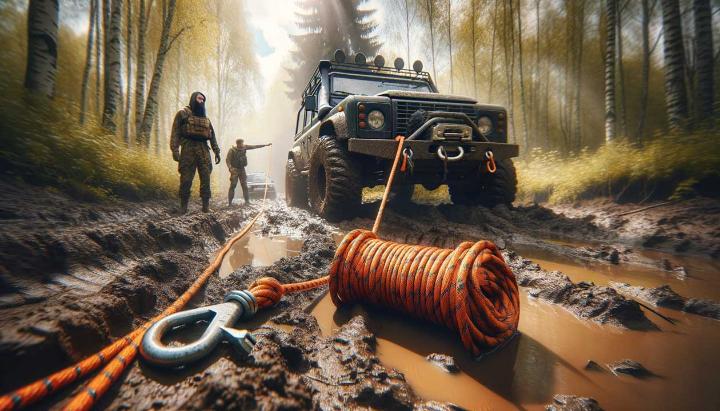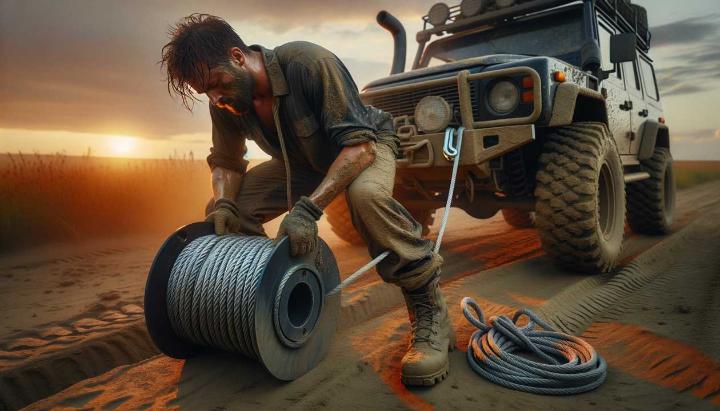Picture this: you're knee-deep in mud, your 4x4 is bogged, and your trusty winch is your only ticket out. But here's the million-dollar question: is your winch cable up to the task? In the high-stakes world of off-roading and heavy-duty recovery, the debate between steel winch cables and their fibre counterparts has never been hotter.
For years, the steel cable for winch has been the go-to choice, praised for its rugged durability. But there's a new player in town, and it's turning heads faster than a V8 engine. Fibre winch cables are revolutionising the game with their impressive breaking strength, lightweight design, and enhanced safety features.
In this post, we'll cut through the noise and get to the heart of the matter: Fiber vs Steel Winch Cable - Which Is Better? We'll explore why the steel cable for sale might not always be your best bet, and why fibre cables are quickly becoming the top choice for savvy off-roaders and recovery experts alike. Buckle up, mates - it's time to discover why your next winch cable could be the difference between conquering the terrain and calling for a tow.
Understanding Steel Winch Cables: Pros and Cons
When it comes to winching, steel cables have long been the go-to choice for many off-road enthusiasts and industries. Let's dive into the world of steel winch cables and explore their strengths and weaknesses.
Durability and Strength of Steel Winch Cables
Steel winch cables are renowned for their ruggedness and ability to withstand harsh conditions. Picture this: you're knee-deep in mud, surrounded by jagged rocks, and your vehicle is stuck. This is where a steel cable truly shines.
- Impressive breaking strength: A typical 5/16" steel cable boasts a breaking strength of 9,800 lbs, making it a reliable workhorse for heavy-duty applications.
- Abrasion resistance: Steel cables laugh in the face of rough terrains, resisting wear and tear from mud, rocks, and sand.
- Temperature tolerance: Whether you're in scorching heat or freezing cold, steel cables maintain their integrity across a wide range of temperatures.
Applications for Steel Winch Cables in Harsh Environments
Steel cables excel in environments that would make other materials quiver. They're the unsung heroes of many industries and activities:
- Off-road recovery: When you're deep in the backcountry, a steel cable can be your ticket out of trouble.
- Construction sites: Steel cables handle the daily grind of moving heavy equipment and materials.
- Marine applications: Saltwater and sun are no match for a properly maintained steel cable.
Steel Cable Maintenance Tip
Regularly inspect and lubricate your steel cable to prevent rust and extend its lifespan.
However, it's not all smooth sailing with steel cables. They do have their drawbacks:
- Weight: Steel cables are significantly heavier than synthetic alternatives, which can affect vehicle handling and fuel efficiency.
- Corrosion potential: Without proper care, steel cables can rust, especially in marine environments.
- Safety concerns: In the event of a cable snap, steel cables store more potential energy, potentially causing dangerous whiplash.
Despite these challenges, many users still swear by steel winch cables for their reliability and cost-effectiveness. When choosing between steel and synthetic options, consider your specific needs and usage environment. For those frequently tackling abrasive terrains or performing heavy-duty winching, a steel cable for winch might just be your best bet.
Remember, whichever type of cable you choose, proper maintenance and safe operation are key to getting the most out of your winching setup. Have you had any memorable experiences with steel winch cables? Share your stories in the comments below!
Exploring Fiber Winch Cables: A Comprehensive Guide
As we venture into the world of off-road adventures and recovery operations, it's time to shine a spotlight on the unsung hero of modern winching: the fiber winch cable. If you've ever found yourself in a sticky situation, you'll know that the right equipment can make all the difference. Let's dive into why fiber winch cables are causing such a stir in the off-road community.
Synthetic vs Steel: Choosing the Right Winch Cable
When it comes to winch cables, the debate between synthetic and steel is as heated as a summer's day in the Outback. As someone who's been stuck in more mud than I care to admit, I can tell you that the choice of cable can make or break your recovery operation. Let's break it down:
- Strength-to-weight ratio: Fiber winch cables, often made from UHMWPE (Ultra-High-Molecular-Weight Polyethylene), boast an impressive strength-to-weight ratio that puts steel to shame. You're looking at a cable that's as strong as steel but floats on water – talk about punching above its weight!
- Flexibility and handling: Ever tried to wrestle with a steel cable in freezing conditions? It's about as fun as cuddling a crocodile. Synthetic winch ropes remain flexible in all temperatures, making them a joy to handle even when the weather turns nasty.
- Safety first: Here's where fiber really shines. In the unlikely event of a cable snap, synthetic ropes don't store energy like steel cables do. This means no deadly whiplash effect – a crucial safety advantage when you're out in the bush.

Maintenance and Longevity of Fiber Winch Cables
Now, I know what you're thinking – "Sounds great, but how do I look after this high-tech rope?" Well, mates, it's easier than you might think. Here are some tips to keep your fiber winch cable in top shape:
- Keep it clean: After a day in the mud, give your synthetic rope a good rinse with fresh water. Let it air dry completely before spooling it back onto the winch.
- Regular inspections: Run the rope through your hands occasionally, feeling for any unusual wear, cuts, or abrasions. If you spot any damage, it's time to consider a winch line replacement.
- UV protection: While synthetic ropes are tough, the Aussie sun can be tougher. When not in use, keep your winch covered to protect the rope from harmful UV rays.
With proper care, a quality fiber winch cable can outlast several steel cables, offering better value in the long run. Plus, when it's time for a replacement, synthetic ropes are often easier to install than their steel counterparts.
So, next time you're gearing up for an off-road adventure or looking to upgrade your recovery equipment, give fiber winch cables a serious thought. They're not just a trend – they're a game-changer in the world of off-road recovery. Have you made the switch to synthetic yet? Share your experiences in the comments below!
Pro Tip
Always wear gloves when handling winch cables, whether they're steel or synthetic. Safety first, adventure second!
Comparing Fiber and Steel Winch Cables: Pros and Cons
When it comes to choosing the right winch cable for your off-road adventures or heavy-duty applications, the debate between fiber and steel cables often leaves many scratching their heads. As someone who's been in the thick of it, let me tell you, the choice can make or break your recovery operation. Let's dive into the nitty-gritty of these two contenders and see how they stack up.
Fiber Core Winch Lines: Flexibility and Lightweight Advantages
Fiber winch cables, often made from synthetic materials like UHMWPE, have been making waves in the off-road community, and for good reason. Here's why they're gaining traction:
- Featherweight champion: Synthetic ropes are incredibly light, making them a breeze to handle. I once switched from steel to fiber, and the difference in weight was like night and day.
- Flexibility is key: These ropes remain pliable even in freezing conditions. No more wrestling with a stiff cable when you're knee-deep in snow!
- Safety first: In the unlikely event of a break, synthetic ropes don't store energy like steel, reducing the risk of dangerous whiplash.
However, it's not all sunshine and rainbows. Fiber ropes can be more susceptible to UV damage and abrasion, especially in rocky terrains. But with proper care, these drawbacks are manageable.
Steel Core Winch Cables: Strength and Durability Benefits
Now, let's not count out our old friend steel just yet. Steel winch cables have been the backbone of recovery operations for decades, and they still have some aces up their sleeve:
- Built like a tank: Steel cables offer unmatched crush resistance and can take a beating from rocks and debris.
- Abrasion warrior: When it comes to muddy, gritty environments, steel cables stand their ground better than their synthetic counterparts.
- Budget-friendly: Generally, steel cables for sale come with a lower initial price tag, which can be appealing for occasional users.
But remember, steel cables are significantly heavier and can be a handful to manage, especially when you're exhausted from a long day of off-roading.

So, which one comes out on top? Well, it depends on your specific needs. If you're frequently tackling abrasive terrains or need that extra bit of durability, a steel cable for winch might be your best bet. But for most off-road enthusiasts looking for a safer, lighter option with impressive strength, fiber winch cables are hard to beat.
In my years of off-roading, I've found that the versatility and ease of use of synthetic ropes often outweigh the marginal durability benefits of steel cables. Plus, the peace of mind that comes with the added safety features of fiber cables is priceless when you're out in the bush.
Have you made the switch from steel to fiber yet? Or are you still on the fence? Share your experiences and thoughts in the comments below. Your insights could be the tipping point for someone else's decision!
Pro Tip
Whichever type you choose, always inspect your winch cable before each use. Safety should never be compromised!
When comparing steel and fiber winch cables, the advantages of fiber cables shine through due to their high breaking strength, lightweight design, and significant safety benefits. Steel winch cables, known for their durability and abrasion resistance, have been favoured traditionally but come with drawbacks such as weight and potential for corrosion. On the other hand, fiber winch cables offer a superior strength-to-weight ratio, flexibility in extreme temperatures, and reduced risk of dangerous whiplash in case of a break. While steel cables for winch excel in harsh, abrasive environments, fiber options provide better long-term value and ease of handling, making them suitable for various applications. For those considering an upgrade, the safety and performance benefits of fiber cables present a compelling case over traditional steel cable for sale.
Get in Touch for Your Custom Rope Solutions!
Explore our wide range of customized rope solutions to match your specific needs. Fill in the form above to discuss how iRopes can help elevate your operations with our high-quality ropes!